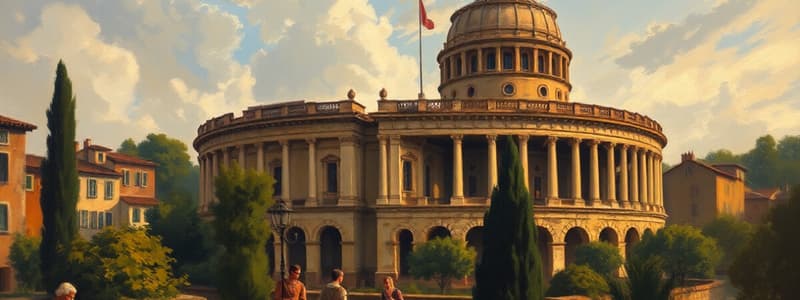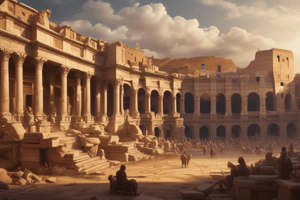Podcast
Questions and Answers
What did the term 'res publica' signify in the context of Roman governance?
What did the term 'res publica' signify in the context of Roman governance?
- Public authority
- Public soldiers
- Public property
- Public affair (correct)
Which group in Roman society primarily represented the upper class with political power?
Which group in Roman society primarily represented the upper class with political power?
- Plebeians
- Consuls
- Tribunes
- Patricians (correct)
What was the primary purpose of the office of Plebeian Tribune?
What was the primary purpose of the office of Plebeian Tribune?
- To command military forces
- To represent patricians
- To advocate for the interests of plebeians (correct)
- To draft laws in the Senate
What was established as the foundation of Roman law in 449 BC?
What was established as the foundation of Roman law in 449 BC?
What is the main function of the Senate in the Roman political system?
What is the main function of the Senate in the Roman political system?
What was the significance of the Council of the Plebs in Roman governance?
What was the significance of the Council of the Plebs in Roman governance?
How long did senators serve in the Roman Senate?
How long did senators serve in the Roman Senate?
What was the role of consuls in the Roman government?
What was the role of consuls in the Roman government?
What was Hannibal's most famous military achievement during the Punic Wars?
What was Hannibal's most famous military achievement during the Punic Wars?
What significant action did the Gracchi brothers attempt in the late Roman Republic?
What significant action did the Gracchi brothers attempt in the late Roman Republic?
The First Triumvirate was formed in response to what situation in Rome?
The First Triumvirate was formed in response to what situation in Rome?
Which of the following reforms was NOT implemented by Julius Caesar?
Which of the following reforms was NOT implemented by Julius Caesar?
What led to the assassination of Julius Caesar in 44 BC?
What led to the assassination of Julius Caesar in 44 BC?
What did Gaius Marius reform to enhance the power of Roman armies?
What did Gaius Marius reform to enhance the power of Roman armies?
Which year marks the beginning of the Punic Wars between Rome and Carthage?
Which year marks the beginning of the Punic Wars between Rome and Carthage?
What was a consequence of the social reforms attempted by the Gracchi brothers?
What was a consequence of the social reforms attempted by the Gracchi brothers?
Who is said to have founded the city of Rome?
Who is said to have founded the city of Rome?
What was the form of government in Rome during the Kingdom period?
What was the form of government in Rome during the Kingdom period?
What is the earliest period of Roman history called?
What is the earliest period of Roman history called?
Which group of people were considered skilled craftsmen and artists, inhabiting the Italian peninsula during Roman history?
Which group of people were considered skilled craftsmen and artists, inhabiting the Italian peninsula during Roman history?
Which of these groups did not reside in the Italian peninsula?
Which of these groups did not reside in the Italian peninsula?
What was the main reason for the settlement and growth of Rome on the Tiber River?
What was the main reason for the settlement and growth of Rome on the Tiber River?
What event marked the end of the Kingdom period in Roman history?
What event marked the end of the Kingdom period in Roman history?
What does the text describe as the center of Roman politics?
What does the text describe as the center of Roman politics?
Why were the Romans able to expand their territory without a set plan?
Why were the Romans able to expand their territory without a set plan?
What was the primary requirement that Rome enforced on conquered enemies?
What was the primary requirement that Rome enforced on conquered enemies?
How did the Romans maintain control over conquered territories?
How did the Romans maintain control over conquered territories?
What was the significance of the Roman extension of citizenship to conquered populations?
What was the significance of the Roman extension of citizenship to conquered populations?
What is the significance of a 'Pyrrhic Victory' as mentioned in the text?
What is the significance of a 'Pyrrhic Victory' as mentioned in the text?
What was the significance of the Romans conquering the Etruscan cities?
What was the significance of the Romans conquering the Etruscan cities?
What does the symbol of the fasces represent?
What does the symbol of the fasces represent?
How did the Roman Empire's ability to incorporate conquered territories contribute to its expansion?
How did the Roman Empire's ability to incorporate conquered territories contribute to its expansion?
Flashcards
Myth of Romulus and Remus
Myth of Romulus and Remus
The story of Romulus and Remus founding Rome is considered a myth.
Myth of Aeneas
Myth of Aeneas
Aeneas was a mythological hero who is said to have been the ancestor of the Romans.
Location of Rome
Location of Rome
Rome's location on the Tiber River, surrounded by seven hills, offered strategic advantages and fertile land for farming.
Etruscans
Etruscans
Signup and view all the flashcards
Latins
Latins
Signup and view all the flashcards
Italic Peoples
Italic Peoples
Signup and view all the flashcards
Greeks in Southern Italy
Greeks in Southern Italy
Signup and view all the flashcards
Roman Kingdom
Roman Kingdom
Signup and view all the flashcards
Roman Republic
Roman Republic
Signup and view all the flashcards
Patricians
Patricians
Signup and view all the flashcards
Plebeians
Plebeians
Signup and view all the flashcards
Conflict of the Orders
Conflict of the Orders
Signup and view all the flashcards
Plebeian Tribune
Plebeian Tribune
Signup and view all the flashcards
Twelve Tables
Twelve Tables
Signup and view all the flashcards
Council of the Plebs
Council of the Plebs
Signup and view all the flashcards
Consuls
Consuls
Signup and view all the flashcards
Roman Expansion
Roman Expansion
Signup and view all the flashcards
Roman Expansion: Integration, Not Assimilation
Roman Expansion: Integration, Not Assimilation
Signup and view all the flashcards
Expansion Through Conflict
Expansion Through Conflict
Signup and view all the flashcards
The Incentive of Roman Citizenship
The Incentive of Roman Citizenship
Signup and view all the flashcards
Provincial Administration
Provincial Administration
Signup and view all the flashcards
Balancing Provincial Power
Balancing Provincial Power
Signup and view all the flashcards
The Symbol of Roman Power: Fasces
The Symbol of Roman Power: Fasces
Signup and view all the flashcards
No Predetermined Plan
No Predetermined Plan
Signup and view all the flashcards
Punic Wars
Punic Wars
Signup and view all the flashcards
Hannibal
Hannibal
Signup and view all the flashcards
Crisis of the Late Roman Republic
Crisis of the Late Roman Republic
Signup and view all the flashcards
The Gracchi brothers
The Gracchi brothers
Signup and view all the flashcards
Gaius Marius
Gaius Marius
Signup and view all the flashcards
First Triumvirate
First Triumvirate
Signup and view all the flashcards
Gaius Julius Caesar
Gaius Julius Caesar
Signup and view all the flashcards
Julian calendar
Julian calendar
Signup and view all the flashcards
Study Notes
Ancient Rome: Part 1
- Rome's name derives from the capital city.
- Traditional accounts place Rome's founding in 753 BC.
- A legend connecting Rome's founding with Aeneas exists.
- The historical truth behind Rome's founding is less dramatic.
- The Capitoline Wolf, an Etruscan figure, dates back to the 5th Century BC, with additions from the 15th Century AD.
- Rome was situated on the Tiber River, surrounded by seven hills.
- These hills and surrounding fields provided fertile farming land.
- Trade in the area was prevalent, particularly with the sophisticated Etruscans and Latins.
- The settlement eventually evolved into a city and then a kingdom.
Origins of the Italian Peninsula
- The Etruscans (or Tusci), inhabiting Tuscany, were skilled craftsmen, artists, and had a unique city-state governing system.
- Etruscan origins are uncertain.
- Other Italic peoples, including the Latins (Romans), Samnites, and Umbrians, inhabited central and Southern Italy.
- Greeks settled in southern Italy (Apulia, Sicily).
Timelines and Periods
- Roman Kingdom: 753 BC - 509 BC (Etruscan kings ruled, Tarquin the Proud was overthrown).
- Roman Republic: 509 BC - 27 BC (divided into Early and Late periods)
- Roman Empire: 27 BC - 286 AD (divided into Principate and Tetrarchy).
The Roman Kingdom
- Seven kings ruled, with Romulus potentially as the first.
- Roman mythology was adopted from the Greeks.
- Roman deities were renamed.
- Temples and public centers, including the Forum, were constructed.
- Rome became a significant trading and prosperous city.
The Roman Republic
- Roman citizens could vote for their leaders.
- Only free-born men were citizens; at first only the wealthy could vote.
- Patricians (land-owning nobility) and Plebeians (common people) fought for power.
- The Conflict of the Orders arose from the struggle for rights.
- Plebeians gained political representation through Tribune, Twelve Tables (written laws), and the Council of the Plebs.
- Elected plebeian officials and plebeians could participate in judicial proceedings.
The Roman Government
- Two Consuls held executive power; one for military command and the other for state matters.
- Senators formed an advisory council and passed decrees.
- Citizen assemblies had legislative, electoral, and judicial authority.
- Government included magistrates (e.g., praetors, tribunes aediles, censors, and quaestors).
- These offices were designed to prevent any single person from gaining excessive power.
- Government systems began to fail by the first century BCE.
Roman Foreign Policy and Expansion
- Rome expanded through conflicts with surrounding regions.
- Rome incorporated conquered territories and populations.
- Cities and regions were permitted to maintain their own institutions.
- Conquering enemies meant access to loot and resources.
- Roman citizenship was sometimes offered to conquered peoples, but voting rights were limited to those physically in Rome.
- Provincial governors were given authority and power, though they had to balance their powers with the needs of Rome.
Roman Expansion
- Romans conquered Etruscans cities by 265 BC.
- Pyhrric War and the fall of Tarent led to the dominance of the Romans over the Greeks.
- Punic Wars were a series of 3 wars fought between Rome and Carthage (264–146 BC).
Late Roman Republic Crisis
- Gracchi brothers attempted reforms.
- Gaius Marius reformed the Roman army.
- The First Triumvirate consisted of Crassus, Pompey, and Caesar.
- They sought to rule Rome.
Gaius Julius Caesar
- Caesar held numerous positions (consul, tribune).
- He conquered Gaul (Gallic Wars)
- He fought a civil war against Pompey.
- Caesar reformed the Roman calendar, increased the magistrates and enlarged Roman citizenship to include provincial citizens.
- The senate assassinated Caesar.
Second Triumvirate and the End of the Republic
- The Second Triumvirate consisted of Octavian, Antony, and Lepidus.
- They targeted Caesar's murderers.
- Conflict emerged between Antony and Octavian, leading to Actium.
- Octavian emerged as the sole ruler of Rome, marking the end of the Roman Republic and the beginning of the Empire.
Studying That Suits You
Use AI to generate personalized quizzes and flashcards to suit your learning preferences.




